A long history of political corruption in NSW — and the downfall of MPs, ministers and premiers
- Written by David Clune, Honorary Associate, Government and International Relations, University of Sydney
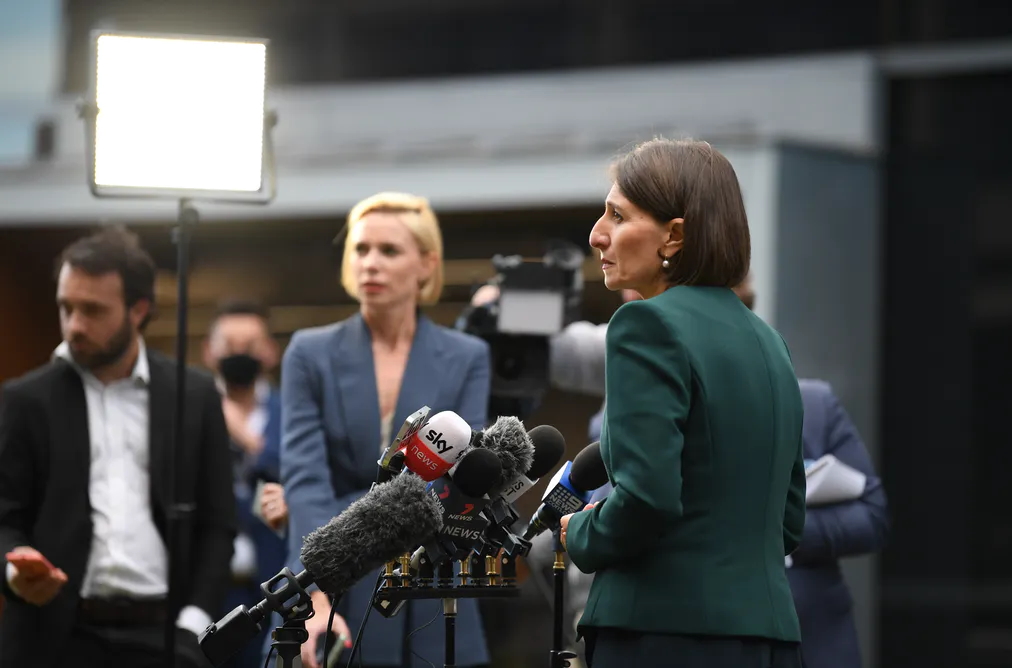
New South Wales Premier Gladys Berejiklian has become ensnared this week in the sensational ICAC hearings into alleged corruption by former MP Daryl Maguire — and suddenly finds her future very much in doubt.
In today’s hearing, Maguire admitted[1] to using his parliamentary office and resources to conduct private business dealings, including receiving thousands of dollars in cash as part of a visa scam.
Meanwhile, Berejiklian, who has denied any wrongdoing[2] by maintaining a personal relationship with Maguire even after he was forced to resign as MP, has faced calls from the Opposition for her to resign.
Read more: Brand Gladys: how ICAC revelations hurt Berejiklian's 'school captain' image[3]
Whether Berejiklian will be forced to step down remains to be seen. But it’s becoming clearer by the day that, at the very least, her reputation[4] will be seriously tarnished by the explosive revelations.
Berejiklian is hardly the first NSW politician to become enmeshed in scandal.
Corruption has been ingrained in the political culture of NSW, from the days of its founding in the 19th century. This is the very reason the Independent Commission Against Corruption was formed in 1988 — and why it remains a vital watchdog over the inner workings of state government.
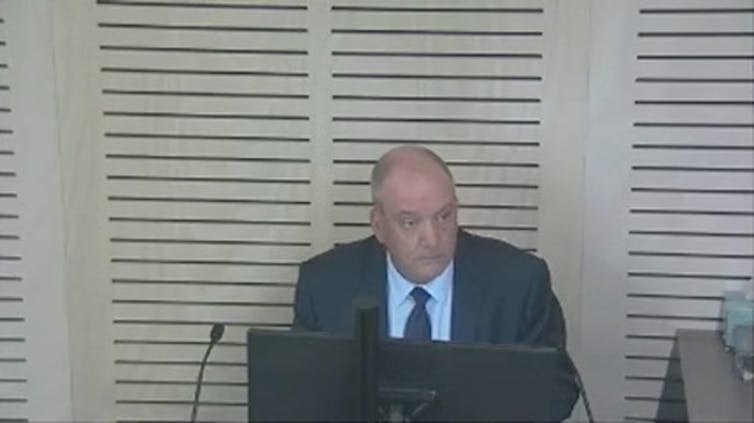 Maguire told ICAC he accepted ‘thousands of dollars’ as part of a cash-for-visa scheme. ICAC
Maguire told ICAC he accepted ‘thousands of dollars’ as part of a cash-for-visa scheme. ICAC
A corrupt old town
Before NSW began governing itself[5] in 1856, the colony was run for many years by the upright, dedicated and incorruptible Colonial Secretary Edward Deas Thomson[6].
With a fully elected parliament and premier, however, things changed. And democratic politics attracted corruption from the beginning.
Historian John Hirst said[7] that after 1856,
to conservatives it appeared as if the government had been debased into a giant system of corruption with needy ministers and members bound together by their joint interest in plunder.
Politics then (and now) was a honey pot: needy, greedy ministers and MPs were always looking to benefit from public works, jobs, development and government contracts, as well as through the manipulation of the criminal justice system.
NSW has also always had a sleazy subterranean network of fixers and door-openers who could influence decisions for the right price.
Sydney has traditionally been thought of as a corrupt old town. Whether this was because of its buccaneering origins in the convict era or because it was where all the action took place has long been an open question.
A few of NSW’s not-so-finer moments
The colony’s early days set the stage for a long history of political and public corruption. Among the more notable episodes:
ICAC is formed — and then brings down its founder
In response to the storm of corruption allegations in the Wran years, Liberal Premier Nick Greiner created[8] the Independent Commission Against Corruption (ICAC). The new body had wide powers, a broad anti-corruption brief and iron-clad independence.
Ironically, Greiner was an early victim of the new body. In 1992, it found him guilty of corruption[9] for appointing renegade Liberal MP Terry Metherell to a senior public service position to allow the government to regain his safe seat.
The finding was overturned by the courts on appeal and most today would agree that Greiner had acted corruptly in only a technical sense. (He had not benefited personally and in the pre-ICAC era, this would have been seen as an astute bit of politics.)
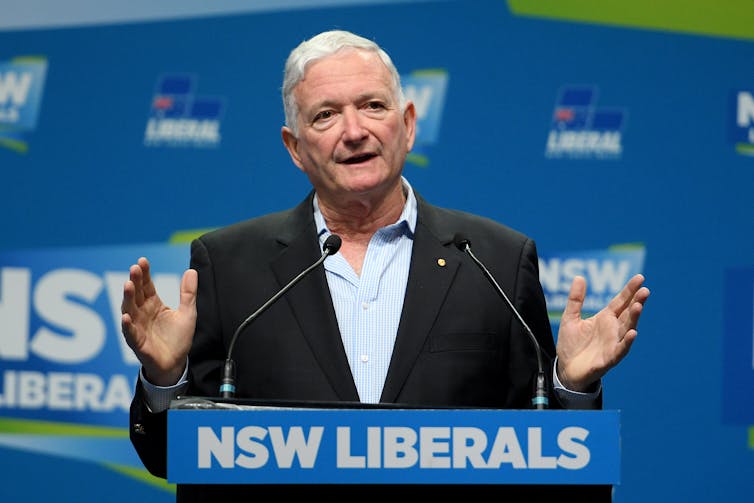 Greiner’s political career ended in 1992 after ICAC expressed concerns over his integrity. DAN HIMBRECHTS/AAP
Greiner’s political career ended in 1992 after ICAC expressed concerns over his integrity. DAN HIMBRECHTS/AAP
Greiner’s downfall was a vivid indication of the seismic shift that had taken place in NSW politics to try and rid the state of corruption.
The previous “nudge, nudge, wink, wink” era of political favours was gone. A problem could no longer be fixed with the right contacts and right sum of money, and turning a blind eye to improper behaviour by “mates” was no longer acceptable.
Everyone in the public sector was on notice that corrupt dealings would be investigated and punished and offenders publicly shamed.
Read more: History repeats: how O'Farrell and Greiner fell foul of ICAC [10]
ICAC itself comes under scrutiny
In 2012-13, ICAC investigations exposed[11] former minister and power-broker Eddie Obeid’s extraordinary influence on the Labor governments of Morris Iemma and Kristina Keneally and the insidious tentacles of the Obeid family’s covert business empire.
Then, in 2014, Liberal Premier Barry O’Farrell resigned[12] after falsely denying to ICAC he had received a bottle of expensive wine from an associate of Obeid’s, who was lobbying for a valuable government contract.
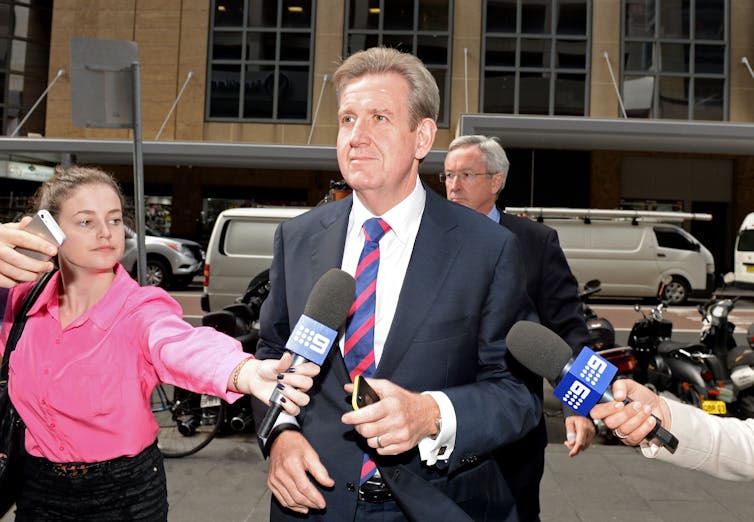 Barry O’Farrell resigned over his inability to remember being gifted a $3,000 bottle of wine. DAN HIMBRECHTS/AAP
Barry O’Farrell resigned over his inability to remember being gifted a $3,000 bottle of wine. DAN HIMBRECHTS/AAP
O’Farrell admitted[13] to a massive failure of memory but was cleared of any wrongdoing by ICAC. Nonetheless, he took the honourable course and resigned.
In recent years, ICAC itself has come under scrutiny. In 2015, it was accused of overreach[14], particularly in its pursuit of Deputy Chief Crown Prosecutor Margaret Cunneen.
David Levine, ICAC’s inspector and a former judge, harshly criticised[15] the commission’s investigation of Cunneen, calling it “unjust, unreasonable and oppressive”.
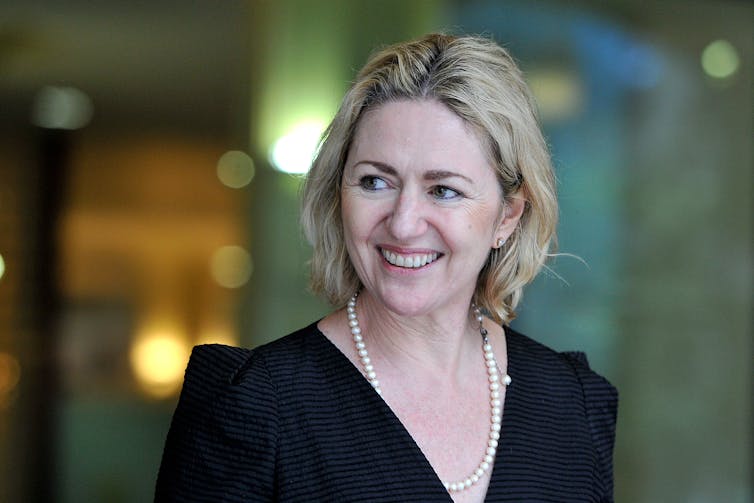 Levine called the inquiry into Cunneen a ‘low point’ in ICAC’s history. JOEL CARRETT/AAP
Levine called the inquiry into Cunneen a ‘low point’ in ICAC’s history. JOEL CARRETT/AAP
Reforms are brought in, but are they enough?
As a result, ICAC was restructured[16] in 2016. The existing single commissioner was replaced by a panel of three — a full-time chief commissioner and two part-time ones.
A decision to proceed to a compulsory examination or public inquiry needed majority approval of the three commissioners. More emphasis was placed on procedural fairness in inquiries.
And the highly respected Supreme Court judge Peter Hall replaced[17] Megan Latham as chief commissioner in August 2017.
Read more: The 'sports rorts' affair shows the need for a proper federal ICAC – with teeth[18]
Levine had also proposed[19] abolishing public inquiries, which he said had resulted in the undeserved trashing of reputations.
He recommended an exoneration protocol for those who had a finding of corrupt conduct made against them but were acquitted in court, and judicial review of ICAC decisions.
These recommendations were rejected at the time, but they may be worth reconsidering — particularly if the inquiry into Maguire’s actions unfairly jeopardises Berejiklian’s premiership.
References
- ^ admitted (twitter.com)
- ^ denied any wrongdoing (www.abc.net.au)
- ^ Brand Gladys: how ICAC revelations hurt Berejiklian's 'school captain' image (theconversation.com)
- ^ reputation (theconversation.com)
- ^ NSW began governing itself (www.parliament.nsw.gov.au)
- ^ Edward Deas Thomson (adb.anu.edu.au)
- ^ said (www.blackincbooks.com.au)
- ^ created (www.icac.nsw.gov.au)
- ^ guilty of corruption (www.smh.com.au)
- ^ History repeats: how O'Farrell and Greiner fell foul of ICAC (theconversation.com)
- ^ exposed (www.abc.net.au)
- ^ resigned (www.abc.net.au)
- ^ admitted (theconversation.com)
- ^ overreach (www.theaustralian.com.au)
- ^ harshly criticised (www.theaustralian.com.au)
- ^ ICAC was restructured (www.abc.net.au)
- ^ replaced (www.smh.com.au)
- ^ The 'sports rorts' affair shows the need for a proper federal ICAC – with teeth (theconversation.com)
- ^ had also proposed (au.news.yahoo.com)













